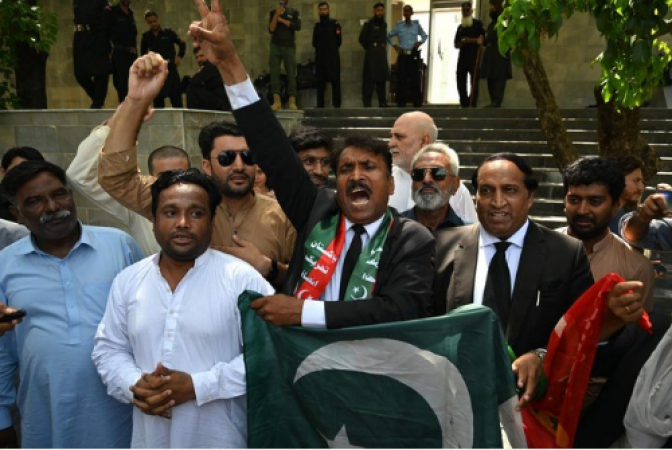
Islambad: A significant legal development unfolded in Pakistan on Tuesday as the Islamabad High Court suspended the prison sentence of former Prime Minister Imran Khan for a graft conviction. The suspension was granted pending Khan's appeal against the conviction, which was originally handed down by a lower court in July.
Khan, a prominent figure in Pakistani politics, had been found guilty of concealing gifts he received from foreign dignitaries during his tenure as prime minister. The lower court had sentenced him to three years in prison, but he had been granted bail while awaiting the outcome of his appeal.
Khan's lawyer, Babar Awan, hailed the Islamabad High Court's decision as a "victory for justice," emphasizing that it offers Khan an opportunity to vindicate his reputation.
Also Read: Powerful Earthquakes Rock Bali and Java Islands, Miraculously No Fatalities Reported
However, the immediate ramifications of the suspension remained uncertain. The court order did not explicitly state whether Khan would be released on bail or required to remain incarcerated until his appeal was heard.
The court's move was met with contrasting reactions from different quarters. Khan's supporters welcomed the decision, interpreting it as evidence that he was being subjected to unfair treatment. They called for his immediate release, underscoring their belief in his innocence.
Conversely, Khan's opponents criticized the court's action, viewing it as a setback in the ongoing fight against corruption. They argued that Khan should be compelled to serve his sentence as originally mandated.
Also Read: Cyprus Police Detain 21 After Night of Anti-Immigrant Violence
The case against Khan is embedded within a larger anti-corruption campaign initiated by the current government led by Shehbaz Sharif. Khan's political rival, Sharif, has accused him of involvement in extensive corruption during his tenure as prime minister.
Khan has consistently denied these allegations, deeming them politically motivated. He has publicly accused the current government of aiming to stifle his voice and suppress his supporters.
The court's decision not only shapes Khan's legal trajectory but also has broader implications for the political landscape of Pakistan. The development is anticipated to further heighten tensions between Khan's supporters and the present government, illuminating the deeply polarized nature of the country's politics.
As Pakistan navigates this legal and political juncture, the ultimate resolution of Khan's case remains uncertain. The court's decision accentuates the intricate interplay between legal proceedings, political rivalries, and public sentiment, all of which contribute to the complex fabric of Pakistan's socio-political sphere.
In the midst of these unfolding events, questions linger over the potential outcomes of Khan's appeal and the subsequent impact on his political career. The suspension of his graft sentence amplifies the broader discourse on accountability, transparency, and the pursuit of justice in Pakistan's governance system.
The case highlights the challenges and complexities that arise when legal matters intersect with the realm of politics. The blurred boundaries between legal proceedings and political agendas underscore the need for a comprehensive and impartial legal framework that safeguards justice while preventing undue influence.
Also Read: Unveiling the Rich Tapestry of India's World Heritage Sites
As the legal process unfolds and Khan's appeal is heard, Pakistan remains at the crossroads of a contentious and critical moment. The outcome of this case could potentially reshape the political landscape, redefine notions of accountability, and shape the narratives surrounding corruption and governance in the country.
In conclusion, the suspension of Imran Khan's graft sentence by the Islamabad High Court has triggered significant implications for both the legal domain and the broader political landscape in Pakistan. The decision stands as a testament to the complexities inherent in the intersection of law and politics, sparking debates on accountability, transparency, and justice. The legal journey that lies ahead for Khan underscores the intricate interplay between legal proceedings, political rivalries, and public sentiment, all of which will undoubtedly shape the trajectory of Pakistan's political discourse.